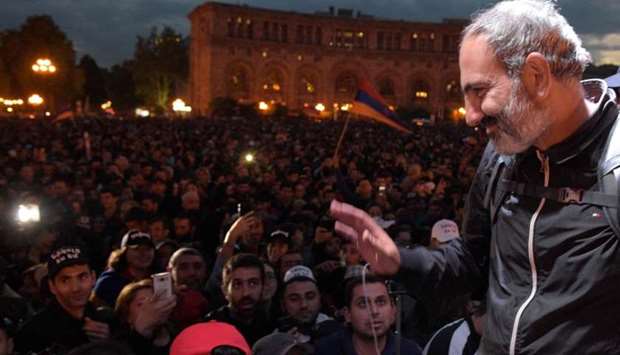Armenian opposition leader Nikol Pashinyan on Monday was formally nominated for the post of prime minister by his supporters, inching closer to victory after two weeks of protests that transformed the country's political landscape.
Pashinyan has called a halt to protests in order to hold high-stakes talks with all political forces ahead of a crucial vote on Tuesday and swapped his trademark khaki-coloured T-shirt for a smart business suit.
‘We are facing the task of resolving the political crisis in the country,’ he told reporters in parliament, announcing the nomination by his Elk coalition.
‘If a prime minister is not elected tomorrow, this crisis will not disappear.’
The leader of the protest movement that ousted the country's veteran leader Serzh Sarkisian last week, Pashinyan is the only candidate in the running for the premiership and insists that only he can rid Armenia of corruption and poverty and conduct free and fair parliamentary elections.
However the 42-year-old former newspaper editor still needs a handful of votes from the ruling Republican Party -- which has a majority of seats in parliament -- to seal his victory in a vote by lawmakers on Tuesday.
The party headed by ousted prime minister Sarkisian has yet to announce its official stance on the vote, even though a senior lawmaker, Vahram Baghdasaryan, has said it would not stand in the way of Pashinyan's candidacy.
The protest leader said he would not beg the Republicans for votes. ‘I don't have to and will not coax them,’ he said.
- 'Political consensus' -
Many political observers said it was highly likely that Pashinyan would be elected prime minister, in a whirlwind development that was unimaginable just two weeks ago in the poor South Caucasus country of 2.9 million people.
‘I see practically no obstacles to Pashinyan becoming a prime minister tomorrow,’ political analyst Hakob Badalyan told AFP.
‘There is political consensus including among the Republicans that the settling of the crisis in this way would serve the interests of the country.’
Another analyst, Ervand Bozoyan, said Pashinyan made everyday Armenians believe that they matter and have the right to determine the future of their country themselves.
‘Beginning from the 1990s people did not believe that change is possible in this country. Now they see that it's possible. People are surprised,’ he told AFP.
‘Nikol has become a hero.’
Observers have expressed fears that the turmoil could destabilise the Moscow-allied nation which has been locked in a territorial dispute with Azerbaijan for decades.
The European Union expressed its support to Armenia in ‘its efforts to build a prosperous and democratic society.’
‘It remains crucial that all parties involved, including the law enforcement agencies and those exercising their right of freedom of assembly and expression, show restraint and responsibility,’ said a statement by the Delegation of the European Union.
Russia has urged compromise while the United States has called for ‘a resolution that reflects the interests of all Armenians.’
- 'Revolution of love' -
Tens of thousands of opposition supporters rallied in the capital Yerevan on Sunday, hoping that a massive show of strength would propel their leader to power.
‘Looking into your eyes, I can say that yes, I am ready -- with a great sense of responsibility -- to assume the prime ministerial duties,’ Pashinyan told the ecstatic crowd Sunday evening.
On Saturday, after days of frantic negotiations, two major parties including the Prosperous Armenia -- which has 31 seats in parliament -- said they would back Pashinyan.
Pashinyan is still six votes short of the 53 he needs from the 105-seat legislature.
Last week, Sarkisian resigned from his new post of prime minister after serving as president for a decade in the face of peaceful protests some dubbed a ‘revolution of love.’
The protest movement had accused him of a power grab, saying he had failed to tackle a litany of problems like corruption, poverty and the influence of oligarchs.
Observers said that Sarkisian's resignation sounded the death knell for the seemingly unshakable rule of the Republican Party which dominated the ex-Soviet republic's politics for over a decade, unchallenged by weak and divided opposition forces.

